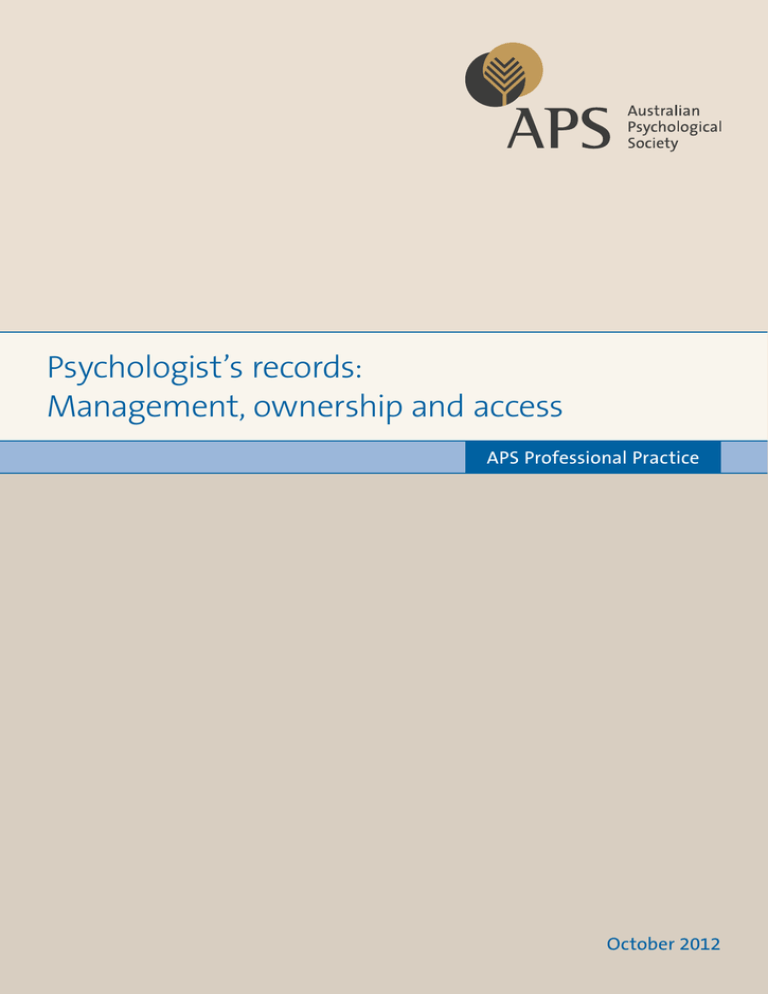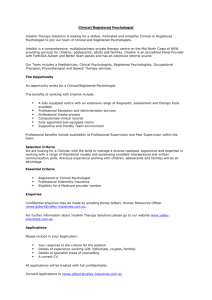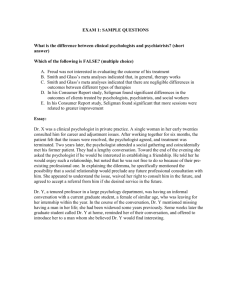Psychologist`s records - Australian Psychological Society
advertisement

Psychologist’s records: Management, ownership and access APS Professional Practice October 2012 Copyright © 2012 Psychologist’s records: Management, ownership and access Table of Contents Executive summary . ................................................................................................................ 4 Introduction ................................................................................................................................ 5 ‘Confidential Client File’ and the ‘Client Service Record’ . ......................................... 6 Ownership.................................................................................................................................... 7 Use................................................................................................................................................... 7 Access ............................................................................................................................................ 8 Access under different employment arrangements.........................................................8 Psychologists in multidisciplinary settings...........................................................................8 Managing requests for access to psychologist’s records........................................... 9 Requests from patients/clients..................................................................................................9 Individuals...........................................................................................................................................9 Couples or participants of groups.............................................................................................9 Requests from third parties, psychologists, employers and the courts..................10 Access to records by third parties...........................................................................................10 Access by other psychologists..................................................................................................10 Access by employers....................................................................................................................10 Access by courts.............................................................................................................................11 Storage........................................................................................................................................ 12 Requests from third parties, psychologists, employers and the courts..................12 Disposal....................................................................................................................................... 12 Appendix...............................................................................................................................13-14 www.psychology.org.au 3 Executive summary • It is best to think of patient/client records as having two components, the administrative component (or unit record in the institutional setting) called the ‘client service record’ and the sensitive component or ‘confidential client file’. • The Code of Ethics clearly places the duty for protection of patient/client privacy and confidentiality on the individual psychologist who collected the information. • Ownership is different to access and whether the psychologist owns the records is dependent on their type of employment. • Access to records is not dependent on who owns the record and obligations vary between settings. • Use of records should be primarily for the purpose for which the information was obtained and for a secondary purpose only if it directly relates to the provision of psychological services and/or with patient/client consent. • Requests made by patients/clients for access to records must be dealt with pursuant to relevant privacy and health records legislation. There are a number of options available to a psychologist in providing access. • Requests from third parties for access to files must be treated in a way that respects confidentiality. Access may only be permitted where the health or wellbeing of the patient/client or another person is threatened by the behavior of the patient/client, or where there are substantiated reasons for a third party insurer or funder to access the confidential client file as part of a clinical audit. • Requests by other psychologists for access must be on a genuine need to know basis and consent by the patient/client is normally obtained. • Requests by the courts will usually be pursuant to legislation and must be complied with. • Refusal of access is permissible in certain circumstances. • Storage and disposal of records must be secure to prevent loss or misuse and disposal must comply with legislation, which is generally seven years following the last date of contact and for children until they have reached 25 years of age. 4 Psychologist’s records: Management, ownership and access Introduction Psychologists are required to maintain records of their interventions with patients/clients. All notes pertaining to the patient/client and recorded by a psychologist are to be maintained as confidential information as required by both relevant national and State or Territory legislation and the APS Code of Ethics (which has been adopted by the Psychology Board of Australia for the profession). In order to discuss access to records it is important to place ‘access’ within the appropriate context. In addition to matters of access, there are four other aspects of dealing with patient/client records summarised here, namely: ownership, use, storage and disposal. In addition, the APS has developed a position on file management that specifies the need for two parts of the file in the psychologist’s system, whether this is in the private practice, public sector or other employment settings. This was driven largely by the issue of access to files which is a constant source of concern to practicing psychologists. The two-part file position is important to keep in mind when considering access to records. www.psychology.org.au 5 ‘Confidential Client File’ and the ‘Client Service Record’ It is essential to distinguish between two components of the patient/client record as this is at the heart of APS member concerns. The rationale for the two-part file position is included in the Appendix, which considers the ethical and professional obligations of psychologists as drivers for the split file. It is best to speak about two parts of the file: • the ‘Confidential Client File’ (sometimes called ‘practitioner notes’) and; • the ‘Client Service Record” (sometimes called ‘client/patient/unit record’). Confidential Client File This is the sensitive section and may contain confidential, sometimes very intimate, information about the patient/client and even about third parties (e.g. partners, parents, children.); it may also include diagnostic material created by the practitioner which may be private to the practitioner; also present may be test records, formal treatment plans or evaluations. A formal medico-legal report might also be stored here. This is the section of the file about which our obligations for providing patient/client privacy under the Code of Ethics are most relevant. The practitioner needs to be aware that under some State and Territory Acts, a patient/client may have qualified access to this part of the record or file. Client Service Record This is the less sensitive section (largely administrative material) and includes: dates and nature of service, basic patient/client demographics and contact details, formal correspondence with third parties, may even store accounts, and standard administrative forms. A brief summary for the team or referrer may also be stored here as such reports are often shared with other professionals already, although this may be open to variation. In the public or NGO sector, this is equivalent to the institutional or organisation unit record where practitioners may record dates of sessions, progress comments or other material that other practitioners, other than psychologists, need to know. 6 Psychologist’s records: Management, ownership and access Ownership When discussing access to records, we must also consider ownership. Ownership is not the same as access. Who owns a psychologist’s records? Employed psychologists The recorded notes are the property of the employer unless the contract of employment states otherwise. In a multidisciplinary practice, the recorded notes will be owned in accordance with the working arrangement of the psychologist whether that is as employee or as a contractor. Contracted psychologists Ownership of records should be covered and clarified in the contract for services. Unless otherwise indicated in the contract, the psychologist is an independent functioning professional and may exercise all the rights of a private practitioner. Independent psychologists in private practice The recorded notes belong to the psychologist. They are not the property of the patient/client or the person or organisation that pays for the service to be provided. Psychologists providing pro-bono services The requirements for ownership of records outlined above apply equally to psychologists who provide pro-bono services with or without a contract , despite there being no payment. Use Psychologist’s records contain personal and/or health information about their patients/clients. That information can be used for the purpose for which it was obtained, which will generally be for the provision of psychological services. That information may be used for a secondary purpose directly related to the provision of psychological services (e.g., provision of other services in a multidisciplinary setting or for research and evaluation purposes when the information has been carefully de-identified) where the individual concerned would reasonably expect the information to be used in that way. It may also be used for any other purpose with the individual’s informed consent. www.psychology.org.au 7 Access Access under different employment arrangements Access is different to ownership. A psychologist may be responsible for restricting access to their psychological records even if they are not the “owner” of those records. That means, for instance, that because the employer owns the file does not remove the psychologist’s obligations to manage access. The psychologist’s obligations may vary between settings. The comments below are made largely with respect to the confidential client file. Employed psychologists While the terms of employment contracts and obligations to employers need to be carefully noted, the responsibility of privacy and confidentiality of patient/client information is still an obligation of the psychologist. Therefore, access to that information is restricted to the psychologist who prepared the material or to another psychologist who may have a professional “need to know” that information, and then only with the consent of the patient/client. It is advisable for employed psychologists (private or public sector) to negotiate or settle access issues as part of their employment agreement1. In some States, employment law may take precedence over other considerations and this needs to be recognised in advance. Seek legal advice where such issues arise. Contracted psychologists Access to the psychologist’s information is restricted to the psychologist who prepared the material or to another psychologist - or other health professional in a multidisciplinary setting - who may have a professional “need to know” that information, and then only with the consent of the patient/client . Independent psychologists in private practice An independent psychologist in private practice need not provide any other person with access to their records unless required to do so pursuant to relevant legislation or with the patients/clients consent. Further information is set out below. Psychologists providing pro-bono services The requirements for access to the psychologist’s records apply equally to psychologists who volunteer to provide services pro-bono regardless of the setting in which those services are provided. Psychologists in multidisciplinary settings Access issues may arise in multidisciplinary agencies. Psychologists’ entries into multidisciplinary records should be brief, factual and focused on relevant information (e.g., diagnosis, risk issues, intervention plan, dates of service). Psychologists should refrain from recording sensitive personal information (e.g., family confidences, third party details, matters not relevant to current treatment). The patient/client should be informed that such a brief record will be kept in a multidisciplinary file, and is therefore accessible by other members of a team. Psychologists must record essential sensitive and personal patient/client information in a separate record system. The records must be secured either in locked filing cabinets or be password protected and quarantined if in an electronic system. These principles need to be conveyed to an employer. This is deemed to be the only way to protect patient/client privacy and the therapeutic relationship (see Appendix). 1 In some situations, the psychologist will still have ongoing responsibility for the file. 8 Psychologist’s records: Management, ownership and access Managing requests for access to psychologist’s records Requests from patients/clients Individuals A patient/client may ask their psychologist for access to their records. The psychologist will facilitate access to those sections of the material that are permissible. The complete record is not necessarily relevant to such a request. There are a number of options available to a psychologist in providing access. For example, the psychologist may bring the patient/client into the office and sit with them while they read the material and, if necessary, discuss what has been written. Alternatively, they may provide a summary or a copy of that material to the patient/client. At the onset of any psychological relationship, patients/clients should be given information on the limits to confidentiality, how privacy of personal information will be managed and who may have access to patient/client records. A request by a patient/client for access to the psychologist’s records about them may be dealt with pursuant to relevant privacy and health records legislation and this may vary from jurisdiction to jurisdiction. In some government agencies and departments, access must be preceded by a Freedom of Information (FOI) application (or, in NSW, Government Information (Public Access) Act Application). Alteration of records If the patient/client believes part of the confidential client file to be inaccurate they may write what they believe to be the accurate statement and the psychologist may add a note to the relevant information or include that statement in the file. Provision of a copy of the recorded material The patient/client may request a copy of the record and a psychologist may charge a reasonable fee for providing a copy, taking into consideration the provisos above. Costs Psychologists may charge a reasonable fee for access to their records. The fee must not be excessive and should only relate to the actual provision of information, not the request for access. Copyrighted assessment instruments The psychologist will not provide copies of copyrighted assessment instruments to any person other than another psychologist who has a professional “need to know” that information. Access to certain materials such as copyrighted material, for example, psychological assessment pro forma, is not permitted as it may render future use of those materials invalid. Couples or participants of groups Where client couples or client groups have been seen by the psychologist, the records of those interactions will be released only with the written consent of all parties who participated. www.psychology.org.au 9 Managing requests for access to psychologist’s records (cont.) Requests from third parties, psychologists, employers and the courts Access to records by third parties Normally the psychologist must maintain as confidential all information recorded during or following an interaction with a patient/client. However, if the health or wellbeing of the patient/client or another person is threatened by the behavior of the patient/client, legislation permits the right to provide access to that information to those who must be involved to protect the patient/client or the threatened person. Such threats may arise from a number of situations: for example, • an emergency requiring the psychologist to provide information to assist in the care of the patient/client; or • a direct and imminent threat to another person whose identity is known In all other cases confidentiality will be respected and protocols observed. With regard to access from third party insurers and funders (e.g. WorkCover, TAC, MAA and Medicare) for audit purposes, the APS supports and endorses the right of access to practice information (client service record) for administrative audits. However, for obvious privacy reasons, not access to the confidential client file without clear limitations and substantiated reasons. Medicare defines the latter as clinical audits that can only be done by appropriate health professionals. Some third party funders have agreed to similar processes. Access by other psychologists If another psychologist has a genuine “need to know” that information for the purpose of providing psychological services or other health services to the patient/client, they would be required to approach the psychologist and discuss the case with them. Consent of the patient/client is normally required prior to discussing a patient/client or providing access to client records. The only situation when patient/client consent is not a requirement is when there is imminent risk to the patient/client or another person. Access by employers If the employer has a legitimate “need to know” information gathered and recorded by a psychologist, for example, to protect the patient/client from harm, the psychologist should have protocols by which the employer should first approach the psychologist to discuss the case with him or her. Normally the consent of the patient/client will have been obtained prior to any discussion unless the exclusion provisions of the Federal Privacy Act 1988 or the State Health Records Acts apply. In a school setting, psychologists may be pressured by principals, staff and parents to share the information in a psychologist’s records. Although, principals may wish to exercise their view of ownership of psychologist’s records, ownership does not imply unrestricted access. The same procedures for psychologists and employers apply. In line with national privacy principles, more specifically Principle 2, use and disclosure, the information collected by a school psychologist can only be used by him or her and disclosed (to other members of staff/principals or the student or others) in a manner consistent with the reason it was first collected and only with the informed consent of the student. 10 Psychologist’s records: Management, ownership and access Access by courts A psychologist’s records may be subpoenaed by courts of law or obtained under warrant by law enforcement authorities. The psychologist must comply with such requests. However, in conjunction with the provision of the subpoenaed material the psychologist may make a written request of the court to withhold some or all of the confidential material from access by the court if it is highly sensitive information and has no bearing on the case. Such a request will be heard by the court, usually on the day the material is due to be submitted. The principle here is the protection of the patient/client or a third party from harm or unwarranted intrusion. See ‘When the subpoena comes’ on the APS website in the practice resources section. Refusing access Psychologists are entitled to ask why access to their records is being sought and may refuse access in the following circumstances where: • access would pose a serious and imminent threat to the life or health of any individual; • access would have an unreasonable impact on privacy of others; • the request for access is frivolous or vexatious; • it would be unlawful to provide access new point if denying access is authorised or required by law; or • providing access would prejudice an investigation of possible unlawful activity or prejudice the investigation by an enforcement body. www.psychology.org.au 11 Storage Requests from third parties, psychologists, employers and the courts The primary obligation in regard to the storage of a psychologist’s records is to ensure that the records are stored securely to prevent loss or misuse, remain confidential and are not readily accessible by a person other than the psychologist. Paper records should be kept in a locked cabinet and electronic records should be password protected. Computer screens should be situated so that they can only be viewed by the psychologist. All filing should be completed promptly and records should not be left in a place where they may be subject to casual inspection, even if the psychologist does not immediately have time to file them appropriately. The transportation of files (particularly hard copies) needs to be managed very carefully (e.g., folders should display a ‘Return to Sender’ address, be carried in a locked case/bag, be marked confidential). The advantage of electronic web-based systems is that files can be securely accessed anywhere without the risks associated with transportation. Disposal Regardless of the work setting, all psychologists should be aware of the timing and method of disposal of psychologists’ records. Legislation regarding disposal of records varies between States and Territories. In general, records regarding adults should be kept for seven years following the date of last contact and records regarding children should be kept until the child attains the age of 25 years. Records must then be destroyed or permanently de-identified. In the Northern Territory, records of Indigenous Australians should be kept throughout the life of the individual. Records may be transferred to another provider with the informed consent of the patient/client concerned. Where a psychologist discovers that a client has died, the psychologist must adhere to the general guidelines above of retaining records for seven years, or until the child attains the age of 25 years, despite the death of the patient/client. A psychologist who has not retained the records of a dead patient/client for seven years may be held in contempt of court for destroying the file prematurely if the file is relevant to a legal dispute regarding the will or the estate of a person that has died. 12 Psychologist’s records: Management, ownership and access Appendix Ethical rationale It is important to provide some explanation of the professional and ethical issues that lie behind the two-part file rationale. Promises of privacy and confidentiality and the therapeutic relationship The professional providing services such as assessment, therapy or expert consultation is faced with a serious dilemma: either promise and deliver privacy or severely limit the openness, quality and effectiveness of the professional relationship. For example, in the management of a mental health issue, the patient/client may need to disclose and discuss, sometimes at length over a number of sessions, very intimate and sensitive issues. This may never have been expected by the patient/ client prior to their engagement in the service provision but patients/clients may ultimately concur with this in the interests of recovery and personal growth. Patients/clients will never do this without reasonable confidence that such discussions are confidential and occur only between themselves and the therapist. The complication is that there is another critical component. For such processes (whether clinical or organisational) to be managed effectively, the professional needs to keep comprehensive notes and in sufficient detail to inform ongoing interactions, appropriate interventions, assessments and even long term management. So either the professional keeps detailed private notes and promises confidentiality (to the best of their ability) or they cannot act in a truly professional way. Failure to keep adequate notes is tantamount to renouncing professional obligations and their Code of Ethics. Section A.5.1 of the Code commits psychologists to safeguarding the confidentiality of information obtained during their provision of services and allows disclosure only under very limited circumstances. At the same time, Section B.2.1 commits them to making and keeping “adequate records”. The confidentiality of practitioner notes and private patient/client information is not negotiable. Apart from the consenting patient/client, the Courts and legislation are the only means by which it can be overridden and even then only with due consideration of justification. An assurance that third party funders, or other health professionals in “the team” are bound by confidentiality agreements misses the vital point and are not adequate protection of the patient/client. The patient/client may just not want others to know regardless of whether it is misused or not. Patients/clients have a right to limit exposure of their personal information. Other members of “the team” do not need to know intimate details - and particularly not third party information, such as facts about the patient’s/client’s relatives etc. Furthermore, information once given away cannot be reclaimed. For instance, acquired knowledge that a patient/client of the team had a history of a-typical sexual practices once revealed to the team cannot be given back, but may be totally irrelevant to the general health treatment. This is an extremely cogent issue where access to the psychologist’s files is occurring as a result of a common file in a GP practice in a small country town and the reception staff may have access to the common file of a patient/client who is at the same time a neighbour. (Appendix continued over page) www.psychology.org.au 13 Appendix (cont.) Informed Consent Another anomalous practice often found in the third party funded setting, but also in hospitals, is the notion of informed consent sought from the patient/client at admission to the service. On so many occasions such consent is neither “informed” nor constitutes genuine “consent”. If receiving health services for a serious condition is contingent upon the patient/client signing to agree to organisational access to their records, then consent may be considered to have been given under duress and not genuine or fair. Furthermore, the grounds and expectations on which a patient/client signs away their right to privacy may change over time, particularly when such a person sees a psychologist about adjustment issues and shares private and intimate facts or thoughts and some of these were recorded in the psychologist’s notes. Therefore, consent has to be ongoing and regularly refreshed as well as more qualified at the beginning, otherwise it cannot be described as informed or true consent. 14 Psychologist’s records: Management, ownership and access Notes www.psychology.org.au For more information about the APS please visit www.psychology.org.au or contact: The Australian Psychological Society Limited PO Box 38, Flinders Lane, VIC, 8009 Telephone: (03) 8662 3300 or 1800 333 497 Fax: (03) 9663 6177 Email: contactus@psychology.org.au ABN 23 000 543 788 © 2012 The Australian Psychological Society Limited




